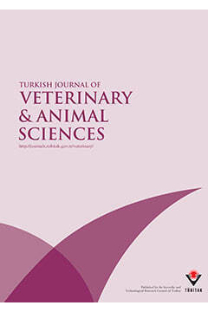The Effects of Some Alternative Feed Additives for Antibiotic Growth Promoters on the Performance and Gut Microflora of Broiler Chicks
In this research, the effects of some alternative feed additives for antibiotic growth promoters on performance and gut microflora were examined using 500, one-day-old Ross 508 broiler chicks. Commercial corn-soy-based broiler starter and finisher diets were formulated as basal diets for control treatment. Basal diets were supplemented with an antibiotic growth promoter, a probiotic, a prebiotic (mannan oligosaccharide) and a humic-acid-based mixture, respectively. It total, five dietary treatments were employed in the experiment. Live weight, weight gain and feed consumption values were not affected significantly by dietary treatments throughout the experiment (P > 0,05). However, chicks which received diets supplemented with growth promoter, prebiotic, probiotic and humic-acid-based mixture had better feed conversion than the control group in both the 4-6 and 0-6 week periods (P < 0.05). Mortality rate, hot carcass yield, and feed cost for kg live weight gain did not show any significant differences among the groups (P > 0.05). Gut microorganism growth was determined in the 2nd and 6th weeks of age by counting the number of aerobic bacteria, total yeast, coliform, E. coli and Entereccoccus. For both periods, no significant differences among the groups were obtained for those microorganisms. Salmonella and Campylobacter were not isolated in any of the samples. In conclusion, prebiotic (mannan oligosccaride), humic-acid-based mixture and probiotic have the potential to be an alternative to antibiotic growth promoters in broiler diets.
Anahtar Kelimeler:
Growth promoter, probiotic, prebiotic, humic acids, broiler performance, gut microflora
The Effects of Some Alternative Feed Additives for Antibiotic Growth Promoters on the Performance and Gut Microflora of Broiler Chicks
In this research, the effects of some alternative feed additives for antibiotic growth promoters on performance and gut microflora were examined using 500, one-day-old Ross 508 broiler chicks. Commercial corn-soy-based broiler starter and finisher diets were formulated as basal diets for control treatment. Basal diets were supplemented with an antibiotic growth promoter, a probiotic, a prebiotic (mannan oligosaccharide) and a humic-acid-based mixture, respectively. It total, five dietary treatments were employed in the experiment. Live weight, weight gain and feed consumption values were not affected significantly by dietary treatments throughout the experiment (P > 0,05). However, chicks which received diets supplemented with growth promoter, prebiotic, probiotic and humic-acid-based mixture had better feed conversion than the control group in both the 4-6 and 0-6 week periods (P < 0.05). Mortality rate, hot carcass yield, and feed cost for kg live weight gain did not show any significant differences among the groups (P > 0.05). Gut microorganism growth was determined in the 2nd and 6th weeks of age by counting the number of aerobic bacteria, total yeast, coliform, E. coli and Entereccoccus. For both periods, no significant differences among the groups were obtained for those microorganisms. Salmonella and Campylobacter were not isolated in any of the samples. In conclusion, prebiotic (mannan oligosccaride), humic-acid-based mixture and probiotic have the potential to be an alternative to antibiotic growth promoters in broiler diets.
Keywords:
Growth promoter, probiotic, prebiotic, humic acids, broiler performance, gut microflora,
- ISSN: 1300-0128
- Yayın Aralığı: Yılda 6 Sayı
- Yayıncı: TÜBİTAK
Sayıdaki Diğer Makaleler
A Study on the Effectiveness of Breeding and Support Policies in Turkey's Cattle Sector
Türkiye sığırcılık sektöründe ıslah ve destekleme politikalarının etkinliği üzerine bir araştırma
Fahri YAVUZ, Atilla KESKİN, Ömer AKBULUT
Color-coded Duplex Sonography of Abdominal Blood Vessels in Dogs
